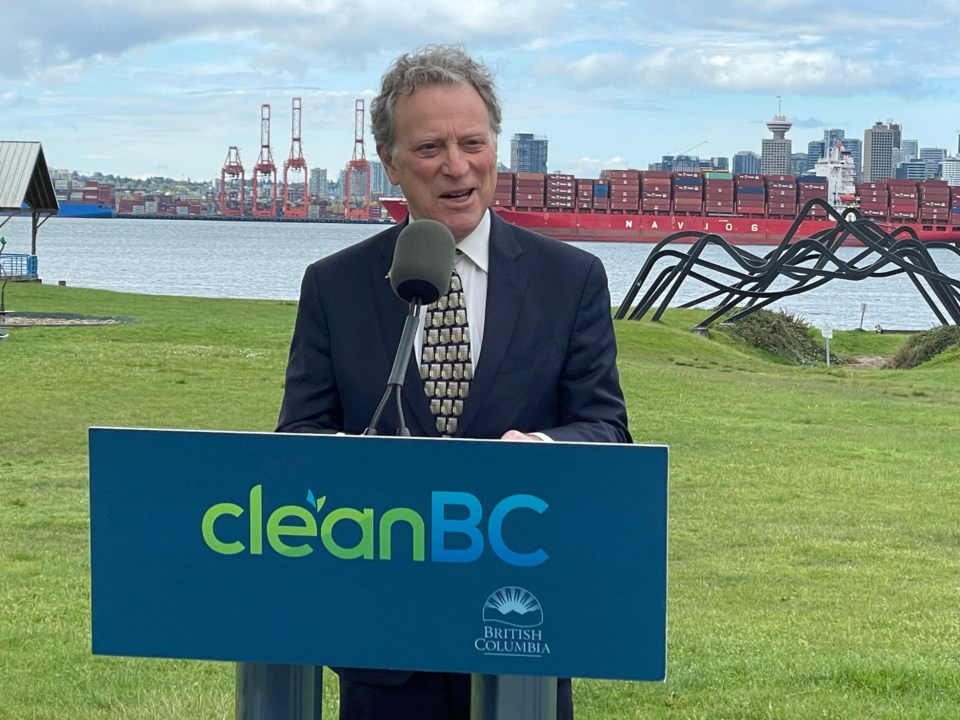Once a sleeper issue confined to the bottom of the ballot in B.C. politics, climate change has roared back onto the political agenda in response to record wildfires, droughts and flooding. Yet discussion of how provincial parties would tackle the climate crisis during an election year has been complicated by a crisis of another kind: Affordability.
High interest rates, inflation, housing and grocery costs have politicians of all stripes tempering their pollution-reduction promises with cost-of-living realities.
“There’s no way that this plan of CleanBC is going to have the effect we desire, and in the meantime we will be spending ourselves into oblivion,” said BC United environment critic Renee Merrifield.
While much of the debate has centred around the carbon tax—BC United proposes to pause it, the Conservatives to end it, the NDP to continue scheduled increases and the Greens to dramatically increase the rate—it is but only one component of the NDP government’s CleanBC plan.
Pollution output caps based on industry type, new BC Hydro clean energy construction, an aggressive push for heat pumps, building code changes and a phase-out of gas-powered vehicles by 2035 are also marquee parts of the plan.
Yet they all walk a delicate balance of cost, with the NDP attempting to backstop them all using aggressive rebate programs.
“Underpinning all of that is our commitment to doing our best to keep life affordable for British Columbians and ensure our economy is healthy,” said Environment Minister George Heyman.
BC United has yet to say if it would scrap B.C.’s legislated promise to follow the international Paris treaty on climate change for a 40 per cent reduction of greenhouse gas emissions from 2007 levels by 2030, rising to 80 per cent by 2050.
It has, however, pointed to the NDP’s own internal economic modelling that says achieving the CleanBC targets could shave $28.1 billion off the provincial economy by 2030, a drop the business community says it’s too steep, too fast.
BC Conservative leader John Rustad said the harms caused by the CleanBC plan are too great compared to the impact. His critics say he barely believes in climate change.
“It’s an approach that sounds good on paper but as a province if we were to stop everything we do, we’re 0.14 per cent of world emissions,” said Rustad.
“If we were just to stop all vehicles, it’s 0.04 per cent of world emissions. It’s not going to do anything in terms of world emissions, but it will destroy B.C.’s quality of life and destroy our economic opportunities.”
Any gains to be found in CleanBC are dwarfed by the NDP’s continued approval of massive pollution projects like liquefied natural gas plants, said BC Green leader Sonia Furstenau.
“That’s not a climate plan for me, it’s a way to keep doing the same thing we’re doing and have a communications strategy that puts up a shield which is how it’s been used for the last four years,” she said.
CleanBC’s heavy focus on the “complicated mathematics” of greenhouse gas emissions and carbon offsets misses the point of trying to make nature and the environment cleaner, said Furstenau.
“It’s this technocratic emissions-oriented plan that is really absent two critical things: nature and humans,” she said, calling it short-sighted in the areas of public transit investment, for example.
B.C.’s latest forecast says it could meet 96 per cent of its 2030 targets.
“I think that’s still pretty good,” said Heyman. “We’ve reduced emissions five per cent since 2018, despite significant population growth and economic growth.”
Still, he admits he’s worried for the future of the plan in an election year in which opponents say modest gains in pollution reduction aren’t worth the cost.
Rustad said Conservatives would develop a more “realistic” plan.
Merrifield said United would end the “virtue signalling” of CleanBC.
“This government has two simple answers, either we’re not going to meet our targets, or do so by shutting down our economy,” she said.
“What we need to do is shift on spending money on what really makes a difference, and CleanBC is not the plan to do that.”
Rob Shaw has spent more than 16 years covering B.C. politics, now reporting for CHEK News and writing for Glacier Media. He is the co-author of the national bestselling book A Matter of Confidence, host of the weekly podcast Political Capital, and a regular guest on CBC Radio.





